Business Ethics - Article Analysis Report: Facebook Data Breach
VerifiedAdded on 2023/05/28
|22
|5738
|346
Report
AI Summary
This report analyzes two articles focusing on ethical issues within a business context, specifically examining the Facebook data breach and its implications. The report identifies key ethical issues, such as the violation of user data privacy and the failure of Facebook to protect user information, and analyzes the affected stakeholders including Facebook, its shareholders, the government, and Facebook users. The discussion links these issues to ethical theories such as utilitarianism and deontology, evaluating the actions of Facebook's management. The report highlights how Facebook's actions, prioritizing profit over user privacy, are considered unethical under both frameworks. Finally, the report recommends actions that Facebook can take to improve ethical compliance and protect user privacy, including the establishment of an ethics committee, implementation of stricter data protection policies, and increased transparency. The analysis underscores the importance of ethical considerations in business practices and the need for companies to prioritize user data security.
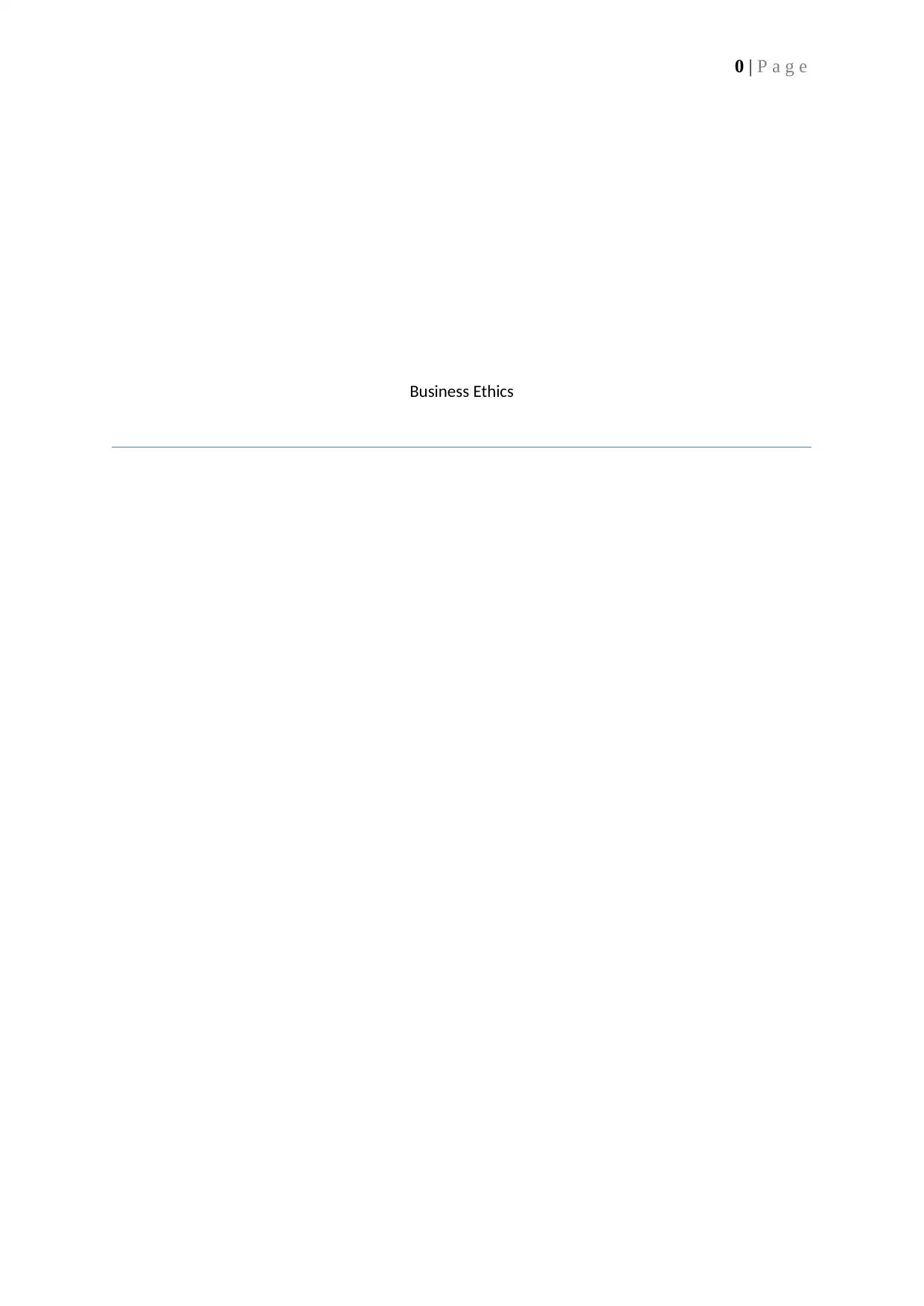
0 | P a g e
Business Ethics
Business Ethics
Paraphrase This Document
Need a fresh take? Get an instant paraphrase of this document with our AI Paraphraser
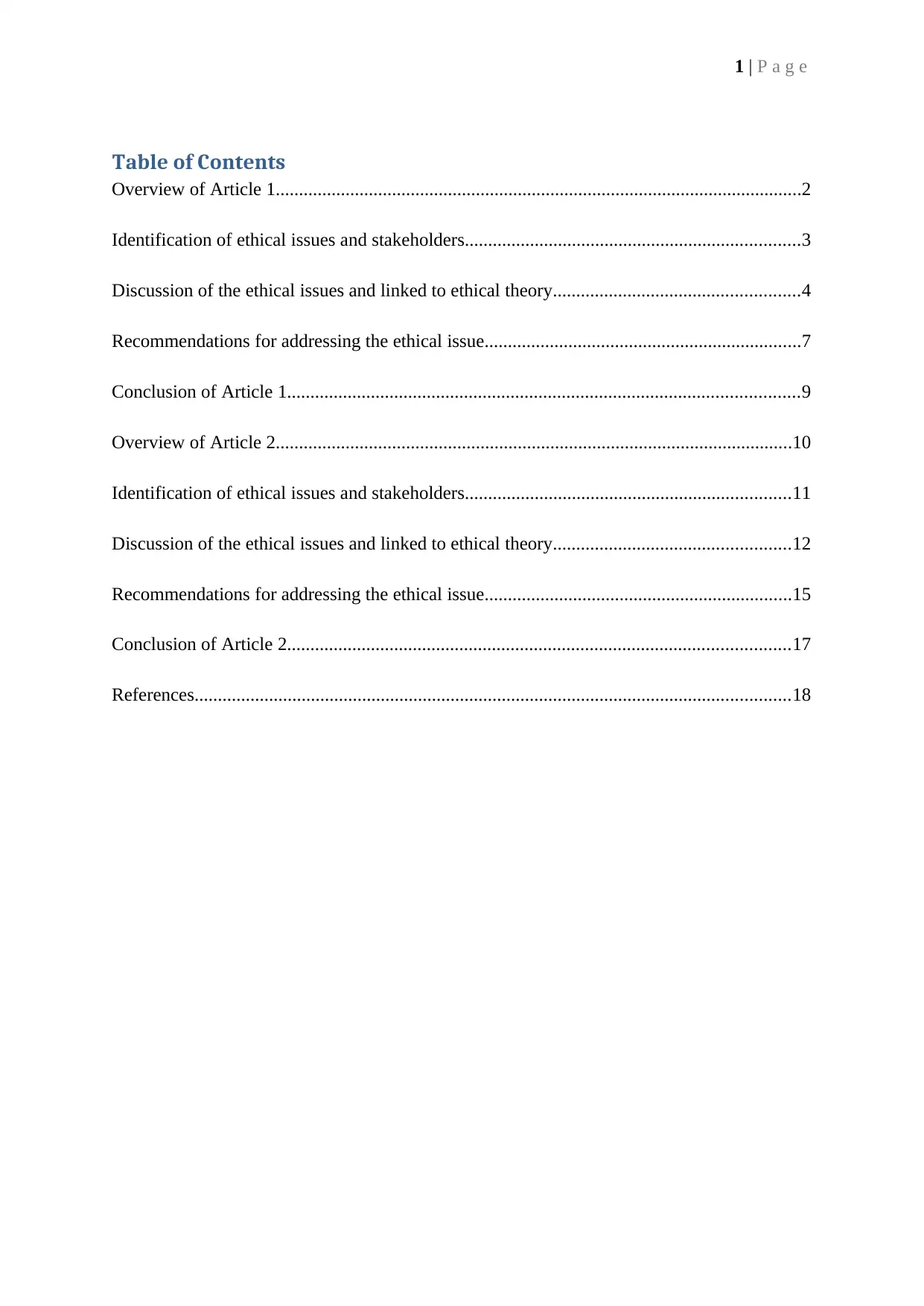
1 | P a g e
Table of Contents
Overview of Article 1.................................................................................................................2
Identification of ethical issues and stakeholders........................................................................3
Discussion of the ethical issues and linked to ethical theory.....................................................4
Recommendations for addressing the ethical issue....................................................................7
Conclusion of Article 1..............................................................................................................9
Overview of Article 2...............................................................................................................10
Identification of ethical issues and stakeholders......................................................................11
Discussion of the ethical issues and linked to ethical theory...................................................12
Recommendations for addressing the ethical issue..................................................................15
Conclusion of Article 2............................................................................................................17
References................................................................................................................................18
Table of Contents
Overview of Article 1.................................................................................................................2
Identification of ethical issues and stakeholders........................................................................3
Discussion of the ethical issues and linked to ethical theory.....................................................4
Recommendations for addressing the ethical issue....................................................................7
Conclusion of Article 1..............................................................................................................9
Overview of Article 2...............................................................................................................10
Identification of ethical issues and stakeholders......................................................................11
Discussion of the ethical issues and linked to ethical theory...................................................12
Recommendations for addressing the ethical issue..................................................................15
Conclusion of Article 2............................................................................................................17
References................................................................................................................................18
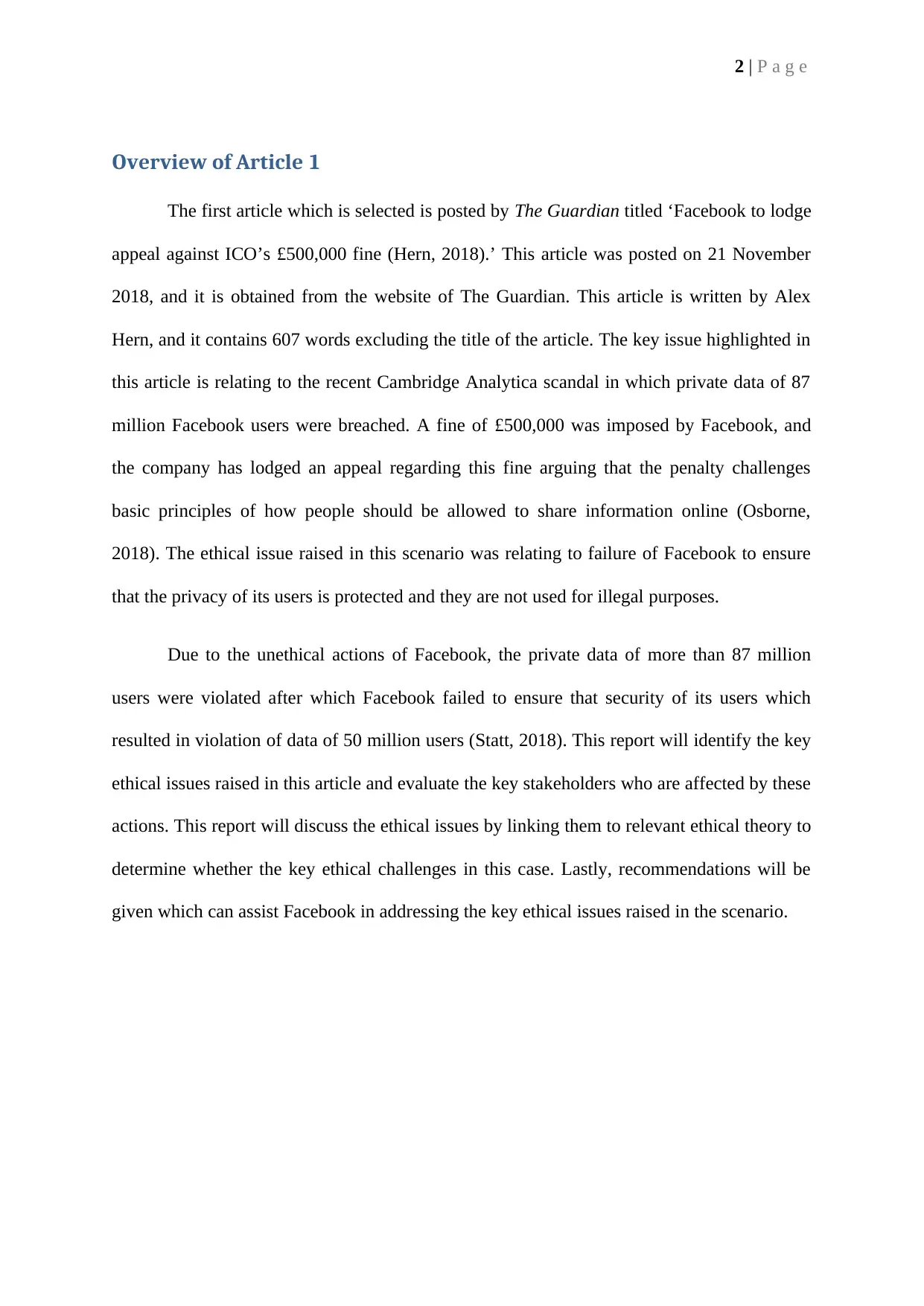
2 | P a g e
Overview of Article 1
The first article which is selected is posted by The Guardian titled ‘Facebook to lodge
appeal against ICO’s £500,000 fine (Hern, 2018).’ This article was posted on 21 November
2018, and it is obtained from the website of The Guardian. This article is written by Alex
Hern, and it contains 607 words excluding the title of the article. The key issue highlighted in
this article is relating to the recent Cambridge Analytica scandal in which private data of 87
million Facebook users were breached. A fine of £500,000 was imposed by Facebook, and
the company has lodged an appeal regarding this fine arguing that the penalty challenges
basic principles of how people should be allowed to share information online (Osborne,
2018). The ethical issue raised in this scenario was relating to failure of Facebook to ensure
that the privacy of its users is protected and they are not used for illegal purposes.
Due to the unethical actions of Facebook, the private data of more than 87 million
users were violated after which Facebook failed to ensure that security of its users which
resulted in violation of data of 50 million users (Statt, 2018). This report will identify the key
ethical issues raised in this article and evaluate the key stakeholders who are affected by these
actions. This report will discuss the ethical issues by linking them to relevant ethical theory to
determine whether the key ethical challenges in this case. Lastly, recommendations will be
given which can assist Facebook in addressing the key ethical issues raised in the scenario.
Overview of Article 1
The first article which is selected is posted by The Guardian titled ‘Facebook to lodge
appeal against ICO’s £500,000 fine (Hern, 2018).’ This article was posted on 21 November
2018, and it is obtained from the website of The Guardian. This article is written by Alex
Hern, and it contains 607 words excluding the title of the article. The key issue highlighted in
this article is relating to the recent Cambridge Analytica scandal in which private data of 87
million Facebook users were breached. A fine of £500,000 was imposed by Facebook, and
the company has lodged an appeal regarding this fine arguing that the penalty challenges
basic principles of how people should be allowed to share information online (Osborne,
2018). The ethical issue raised in this scenario was relating to failure of Facebook to ensure
that the privacy of its users is protected and they are not used for illegal purposes.
Due to the unethical actions of Facebook, the private data of more than 87 million
users were violated after which Facebook failed to ensure that security of its users which
resulted in violation of data of 50 million users (Statt, 2018). This report will identify the key
ethical issues raised in this article and evaluate the key stakeholders who are affected by these
actions. This report will discuss the ethical issues by linking them to relevant ethical theory to
determine whether the key ethical challenges in this case. Lastly, recommendations will be
given which can assist Facebook in addressing the key ethical issues raised in the scenario.
⊘ This is a preview!⊘
Do you want full access?
Subscribe today to unlock all pages.

Trusted by 1+ million students worldwide
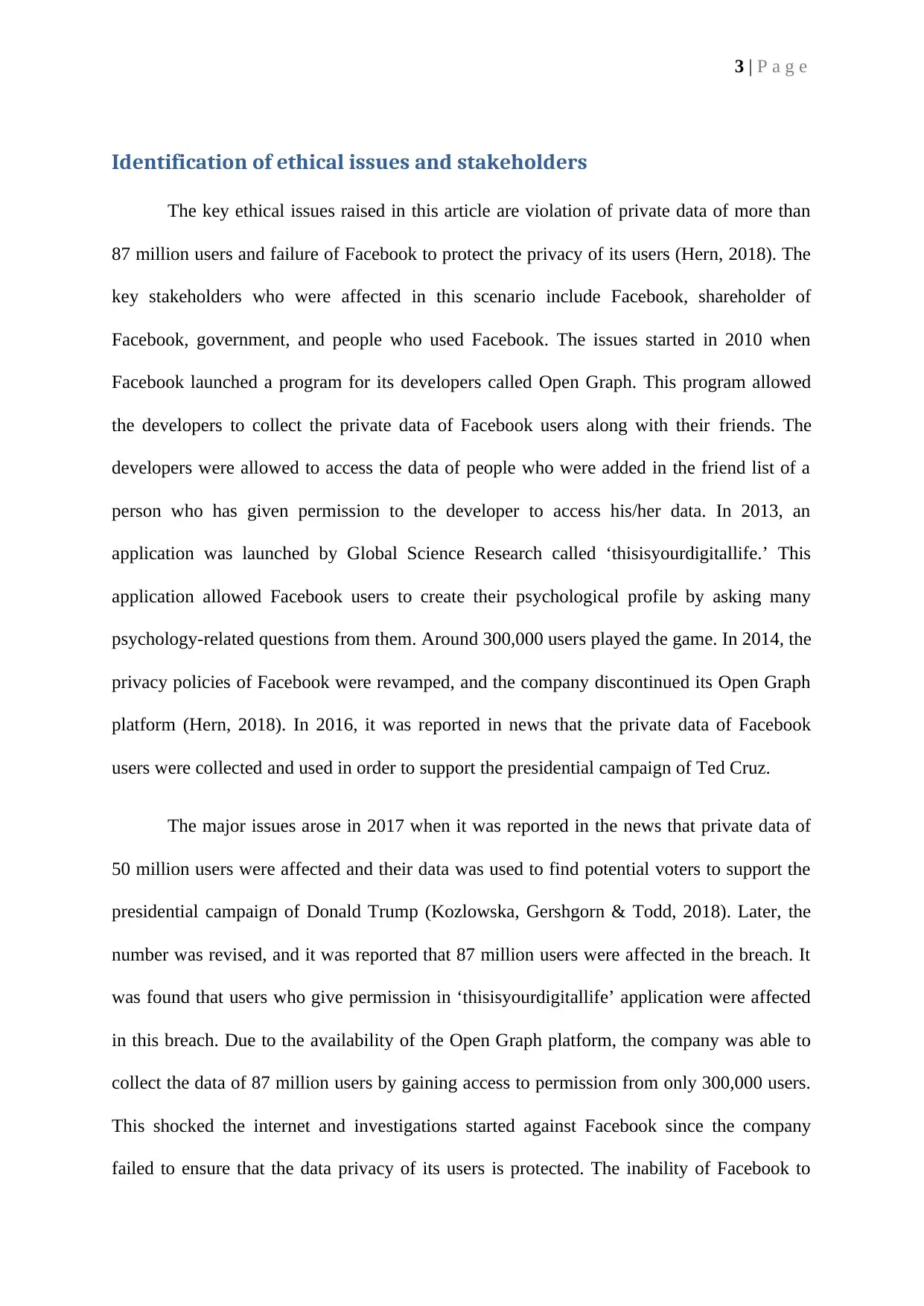
3 | P a g e
Identification of ethical issues and stakeholders
The key ethical issues raised in this article are violation of private data of more than
87 million users and failure of Facebook to protect the privacy of its users (Hern, 2018). The
key stakeholders who were affected in this scenario include Facebook, shareholder of
Facebook, government, and people who used Facebook. The issues started in 2010 when
Facebook launched a program for its developers called Open Graph. This program allowed
the developers to collect the private data of Facebook users along with their friends. The
developers were allowed to access the data of people who were added in the friend list of a
person who has given permission to the developer to access his/her data. In 2013, an
application was launched by Global Science Research called ‘thisisyourdigitallife.’ This
application allowed Facebook users to create their psychological profile by asking many
psychology-related questions from them. Around 300,000 users played the game. In 2014, the
privacy policies of Facebook were revamped, and the company discontinued its Open Graph
platform (Hern, 2018). In 2016, it was reported in news that the private data of Facebook
users were collected and used in order to support the presidential campaign of Ted Cruz.
The major issues arose in 2017 when it was reported in the news that private data of
50 million users were affected and their data was used to find potential voters to support the
presidential campaign of Donald Trump (Kozlowska, Gershgorn & Todd, 2018). Later, the
number was revised, and it was reported that 87 million users were affected in the breach. It
was found that users who give permission in ‘thisisyourdigitallife’ application were affected
in this breach. Due to the availability of the Open Graph platform, the company was able to
collect the data of 87 million users by gaining access to permission from only 300,000 users.
This shocked the internet and investigations started against Facebook since the company
failed to ensure that the data privacy of its users is protected. The inability of Facebook to
Identification of ethical issues and stakeholders
The key ethical issues raised in this article are violation of private data of more than
87 million users and failure of Facebook to protect the privacy of its users (Hern, 2018). The
key stakeholders who were affected in this scenario include Facebook, shareholder of
Facebook, government, and people who used Facebook. The issues started in 2010 when
Facebook launched a program for its developers called Open Graph. This program allowed
the developers to collect the private data of Facebook users along with their friends. The
developers were allowed to access the data of people who were added in the friend list of a
person who has given permission to the developer to access his/her data. In 2013, an
application was launched by Global Science Research called ‘thisisyourdigitallife.’ This
application allowed Facebook users to create their psychological profile by asking many
psychology-related questions from them. Around 300,000 users played the game. In 2014, the
privacy policies of Facebook were revamped, and the company discontinued its Open Graph
platform (Hern, 2018). In 2016, it was reported in news that the private data of Facebook
users were collected and used in order to support the presidential campaign of Ted Cruz.
The major issues arose in 2017 when it was reported in the news that private data of
50 million users were affected and their data was used to find potential voters to support the
presidential campaign of Donald Trump (Kozlowska, Gershgorn & Todd, 2018). Later, the
number was revised, and it was reported that 87 million users were affected in the breach. It
was found that users who give permission in ‘thisisyourdigitallife’ application were affected
in this breach. Due to the availability of the Open Graph platform, the company was able to
collect the data of 87 million users by gaining access to permission from only 300,000 users.
This shocked the internet and investigations started against Facebook since the company
failed to ensure that the data privacy of its users is protected. The inability of Facebook to
Paraphrase This Document
Need a fresh take? Get an instant paraphrase of this document with our AI Paraphraser
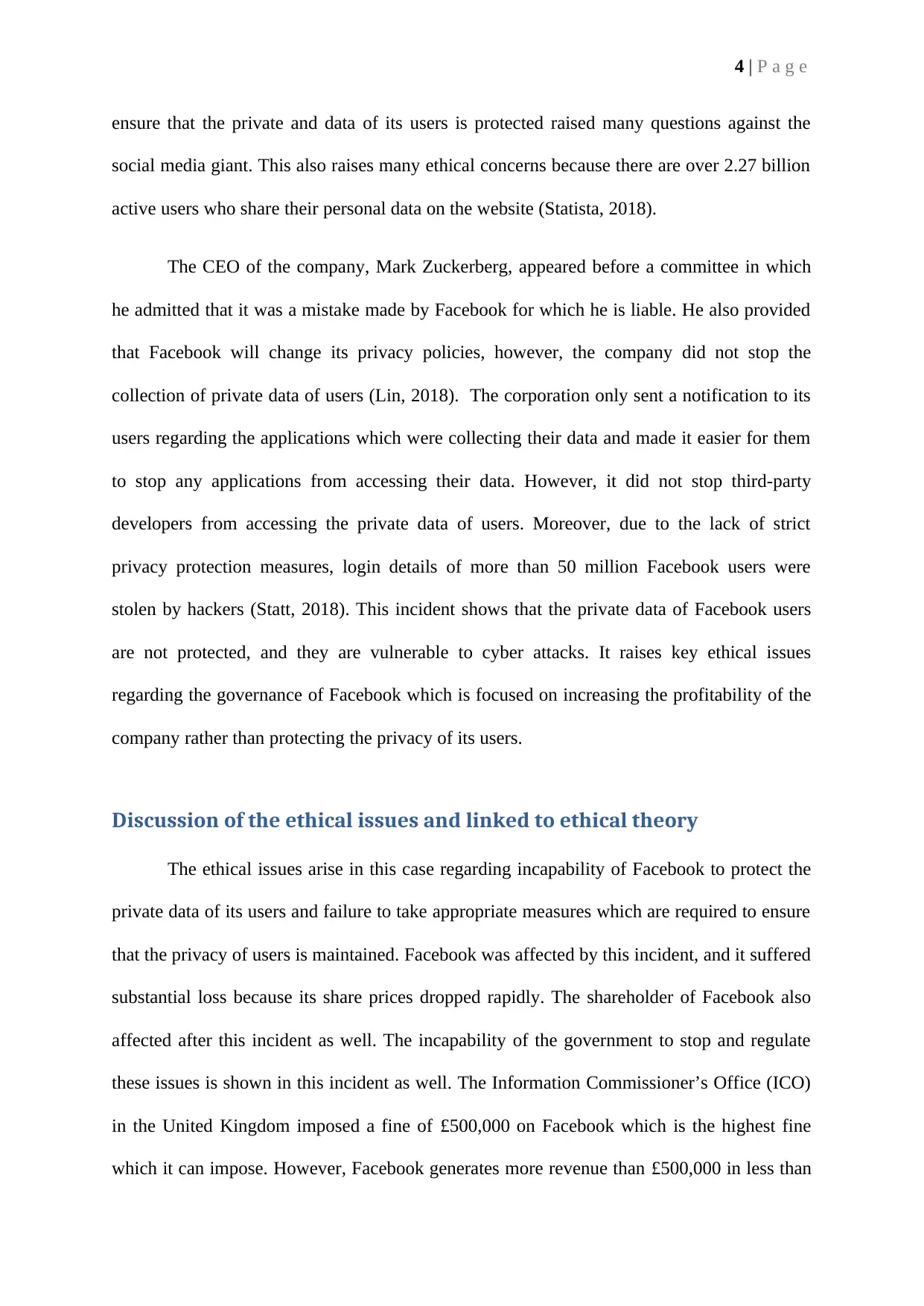
4 | P a g e
ensure that the private and data of its users is protected raised many questions against the
social media giant. This also raises many ethical concerns because there are over 2.27 billion
active users who share their personal data on the website (Statista, 2018).
The CEO of the company, Mark Zuckerberg, appeared before a committee in which
he admitted that it was a mistake made by Facebook for which he is liable. He also provided
that Facebook will change its privacy policies, however, the company did not stop the
collection of private data of users (Lin, 2018). The corporation only sent a notification to its
users regarding the applications which were collecting their data and made it easier for them
to stop any applications from accessing their data. However, it did not stop third-party
developers from accessing the private data of users. Moreover, due to the lack of strict
privacy protection measures, login details of more than 50 million Facebook users were
stolen by hackers (Statt, 2018). This incident shows that the private data of Facebook users
are not protected, and they are vulnerable to cyber attacks. It raises key ethical issues
regarding the governance of Facebook which is focused on increasing the profitability of the
company rather than protecting the privacy of its users.
Discussion of the ethical issues and linked to ethical theory
The ethical issues arise in this case regarding incapability of Facebook to protect the
private data of its users and failure to take appropriate measures which are required to ensure
that the privacy of users is maintained. Facebook was affected by this incident, and it suffered
substantial loss because its share prices dropped rapidly. The shareholder of Facebook also
affected after this incident as well. The incapability of the government to stop and regulate
these issues is shown in this incident as well. The Information Commissioner’s Office (ICO)
in the United Kingdom imposed a fine of £500,000 on Facebook which is the highest fine
which it can impose. However, Facebook generates more revenue than £500,000 in less than
ensure that the private and data of its users is protected raised many questions against the
social media giant. This also raises many ethical concerns because there are over 2.27 billion
active users who share their personal data on the website (Statista, 2018).
The CEO of the company, Mark Zuckerberg, appeared before a committee in which
he admitted that it was a mistake made by Facebook for which he is liable. He also provided
that Facebook will change its privacy policies, however, the company did not stop the
collection of private data of users (Lin, 2018). The corporation only sent a notification to its
users regarding the applications which were collecting their data and made it easier for them
to stop any applications from accessing their data. However, it did not stop third-party
developers from accessing the private data of users. Moreover, due to the lack of strict
privacy protection measures, login details of more than 50 million Facebook users were
stolen by hackers (Statt, 2018). This incident shows that the private data of Facebook users
are not protected, and they are vulnerable to cyber attacks. It raises key ethical issues
regarding the governance of Facebook which is focused on increasing the profitability of the
company rather than protecting the privacy of its users.
Discussion of the ethical issues and linked to ethical theory
The ethical issues arise in this case regarding incapability of Facebook to protect the
private data of its users and failure to take appropriate measures which are required to ensure
that the privacy of users is maintained. Facebook was affected by this incident, and it suffered
substantial loss because its share prices dropped rapidly. The shareholder of Facebook also
affected after this incident as well. The incapability of the government to stop and regulate
these issues is shown in this incident as well. The Information Commissioner’s Office (ICO)
in the United Kingdom imposed a fine of £500,000 on Facebook which is the highest fine
which it can impose. However, Facebook generates more revenue than £500,000 in less than
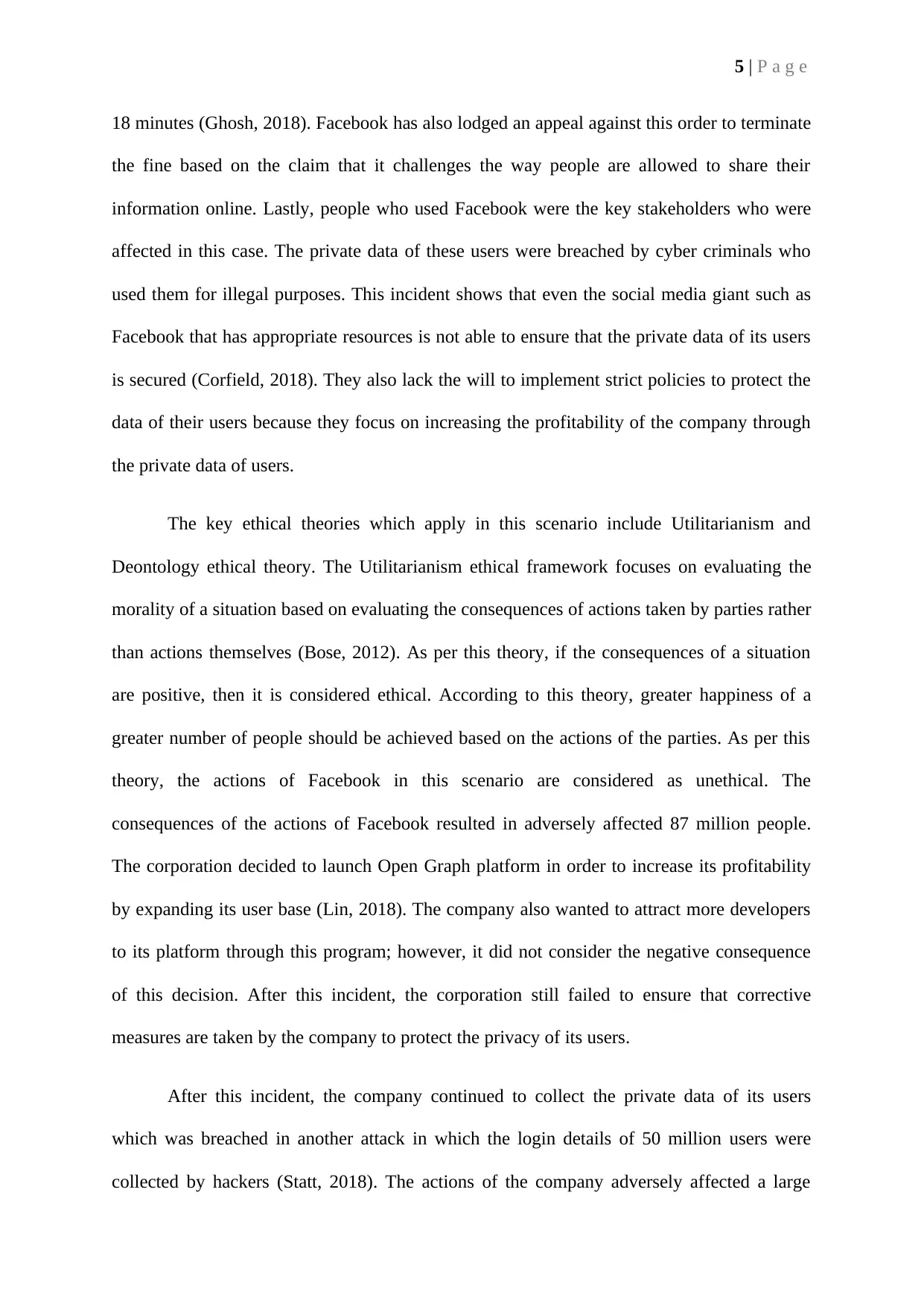
5 | P a g e
18 minutes (Ghosh, 2018). Facebook has also lodged an appeal against this order to terminate
the fine based on the claim that it challenges the way people are allowed to share their
information online. Lastly, people who used Facebook were the key stakeholders who were
affected in this case. The private data of these users were breached by cyber criminals who
used them for illegal purposes. This incident shows that even the social media giant such as
Facebook that has appropriate resources is not able to ensure that the private data of its users
is secured (Corfield, 2018). They also lack the will to implement strict policies to protect the
data of their users because they focus on increasing the profitability of the company through
the private data of users.
The key ethical theories which apply in this scenario include Utilitarianism and
Deontology ethical theory. The Utilitarianism ethical framework focuses on evaluating the
morality of a situation based on evaluating the consequences of actions taken by parties rather
than actions themselves (Bose, 2012). As per this theory, if the consequences of a situation
are positive, then it is considered ethical. According to this theory, greater happiness of a
greater number of people should be achieved based on the actions of the parties. As per this
theory, the actions of Facebook in this scenario are considered as unethical. The
consequences of the actions of Facebook resulted in adversely affected 87 million people.
The corporation decided to launch Open Graph platform in order to increase its profitability
by expanding its user base (Lin, 2018). The company also wanted to attract more developers
to its platform through this program; however, it did not consider the negative consequence
of this decision. After this incident, the corporation still failed to ensure that corrective
measures are taken by the company to protect the privacy of its users.
After this incident, the company continued to collect the private data of its users
which was breached in another attack in which the login details of 50 million users were
collected by hackers (Statt, 2018). The actions of the company adversely affected a large
18 minutes (Ghosh, 2018). Facebook has also lodged an appeal against this order to terminate
the fine based on the claim that it challenges the way people are allowed to share their
information online. Lastly, people who used Facebook were the key stakeholders who were
affected in this case. The private data of these users were breached by cyber criminals who
used them for illegal purposes. This incident shows that even the social media giant such as
Facebook that has appropriate resources is not able to ensure that the private data of its users
is secured (Corfield, 2018). They also lack the will to implement strict policies to protect the
data of their users because they focus on increasing the profitability of the company through
the private data of users.
The key ethical theories which apply in this scenario include Utilitarianism and
Deontology ethical theory. The Utilitarianism ethical framework focuses on evaluating the
morality of a situation based on evaluating the consequences of actions taken by parties rather
than actions themselves (Bose, 2012). As per this theory, if the consequences of a situation
are positive, then it is considered ethical. According to this theory, greater happiness of a
greater number of people should be achieved based on the actions of the parties. As per this
theory, the actions of Facebook in this scenario are considered as unethical. The
consequences of the actions of Facebook resulted in adversely affected 87 million people.
The corporation decided to launch Open Graph platform in order to increase its profitability
by expanding its user base (Lin, 2018). The company also wanted to attract more developers
to its platform through this program; however, it did not consider the negative consequence
of this decision. After this incident, the corporation still failed to ensure that corrective
measures are taken by the company to protect the privacy of its users.
After this incident, the company continued to collect the private data of its users
which was breached in another attack in which the login details of 50 million users were
collected by hackers (Statt, 2018). The actions of the company adversely affected a large
⊘ This is a preview!⊘
Do you want full access?
Subscribe today to unlock all pages.

Trusted by 1+ million students worldwide
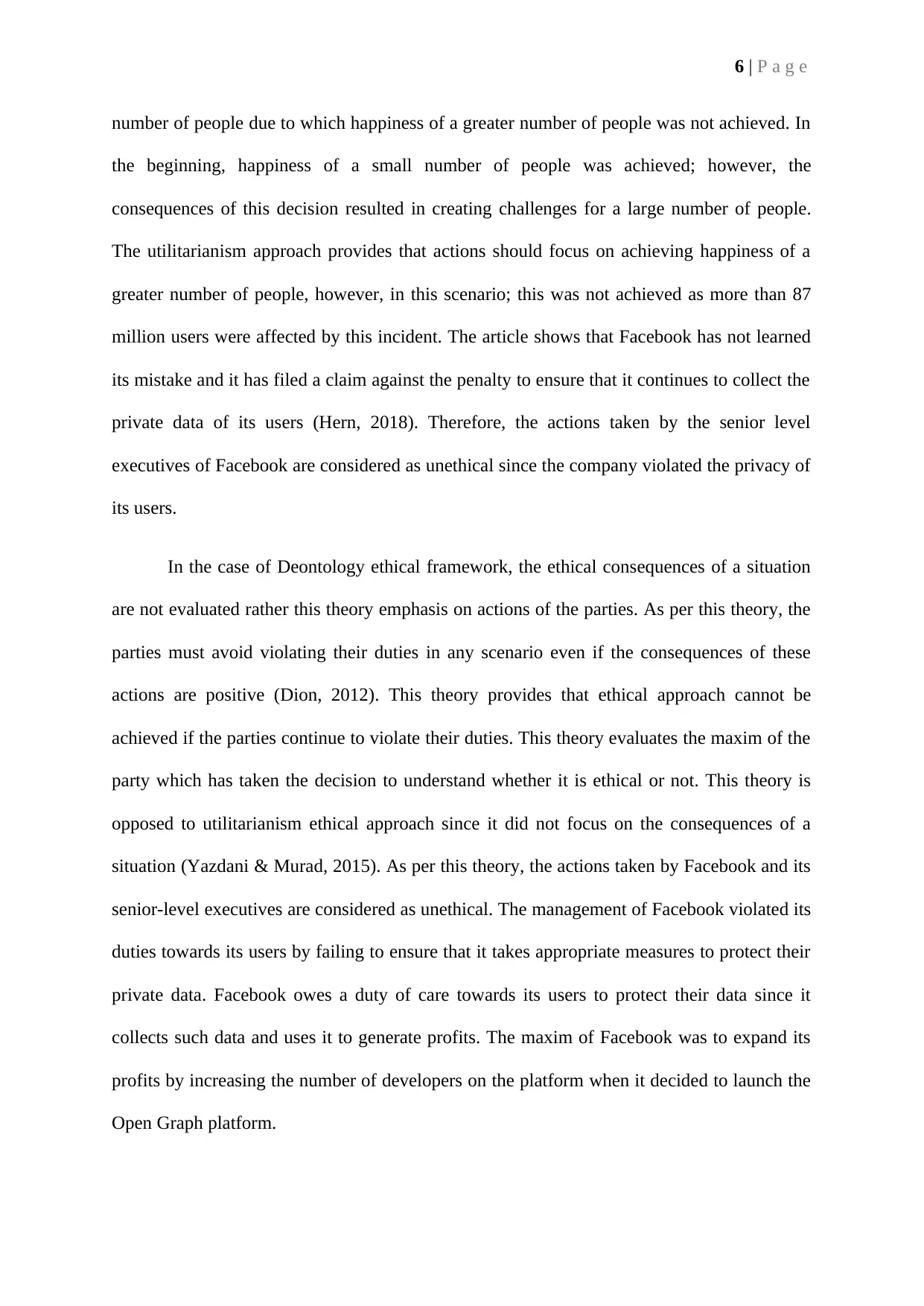
6 | P a g e
number of people due to which happiness of a greater number of people was not achieved. In
the beginning, happiness of a small number of people was achieved; however, the
consequences of this decision resulted in creating challenges for a large number of people.
The utilitarianism approach provides that actions should focus on achieving happiness of a
greater number of people, however, in this scenario; this was not achieved as more than 87
million users were affected by this incident. The article shows that Facebook has not learned
its mistake and it has filed a claim against the penalty to ensure that it continues to collect the
private data of its users (Hern, 2018). Therefore, the actions taken by the senior level
executives of Facebook are considered as unethical since the company violated the privacy of
its users.
In the case of Deontology ethical framework, the ethical consequences of a situation
are not evaluated rather this theory emphasis on actions of the parties. As per this theory, the
parties must avoid violating their duties in any scenario even if the consequences of these
actions are positive (Dion, 2012). This theory provides that ethical approach cannot be
achieved if the parties continue to violate their duties. This theory evaluates the maxim of the
party which has taken the decision to understand whether it is ethical or not. This theory is
opposed to utilitarianism ethical approach since it did not focus on the consequences of a
situation (Yazdani & Murad, 2015). As per this theory, the actions taken by Facebook and its
senior-level executives are considered as unethical. The management of Facebook violated its
duties towards its users by failing to ensure that it takes appropriate measures to protect their
private data. Facebook owes a duty of care towards its users to protect their data since it
collects such data and uses it to generate profits. The maxim of Facebook was to expand its
profits by increasing the number of developers on the platform when it decided to launch the
Open Graph platform.
number of people due to which happiness of a greater number of people was not achieved. In
the beginning, happiness of a small number of people was achieved; however, the
consequences of this decision resulted in creating challenges for a large number of people.
The utilitarianism approach provides that actions should focus on achieving happiness of a
greater number of people, however, in this scenario; this was not achieved as more than 87
million users were affected by this incident. The article shows that Facebook has not learned
its mistake and it has filed a claim against the penalty to ensure that it continues to collect the
private data of its users (Hern, 2018). Therefore, the actions taken by the senior level
executives of Facebook are considered as unethical since the company violated the privacy of
its users.
In the case of Deontology ethical framework, the ethical consequences of a situation
are not evaluated rather this theory emphasis on actions of the parties. As per this theory, the
parties must avoid violating their duties in any scenario even if the consequences of these
actions are positive (Dion, 2012). This theory provides that ethical approach cannot be
achieved if the parties continue to violate their duties. This theory evaluates the maxim of the
party which has taken the decision to understand whether it is ethical or not. This theory is
opposed to utilitarianism ethical approach since it did not focus on the consequences of a
situation (Yazdani & Murad, 2015). As per this theory, the actions taken by Facebook and its
senior-level executives are considered as unethical. The management of Facebook violated its
duties towards its users by failing to ensure that it takes appropriate measures to protect their
private data. Facebook owes a duty of care towards its users to protect their data since it
collects such data and uses it to generate profits. The maxim of Facebook was to expand its
profits by increasing the number of developers on the platform when it decided to launch the
Open Graph platform.
Paraphrase This Document
Need a fresh take? Get an instant paraphrase of this document with our AI Paraphraser
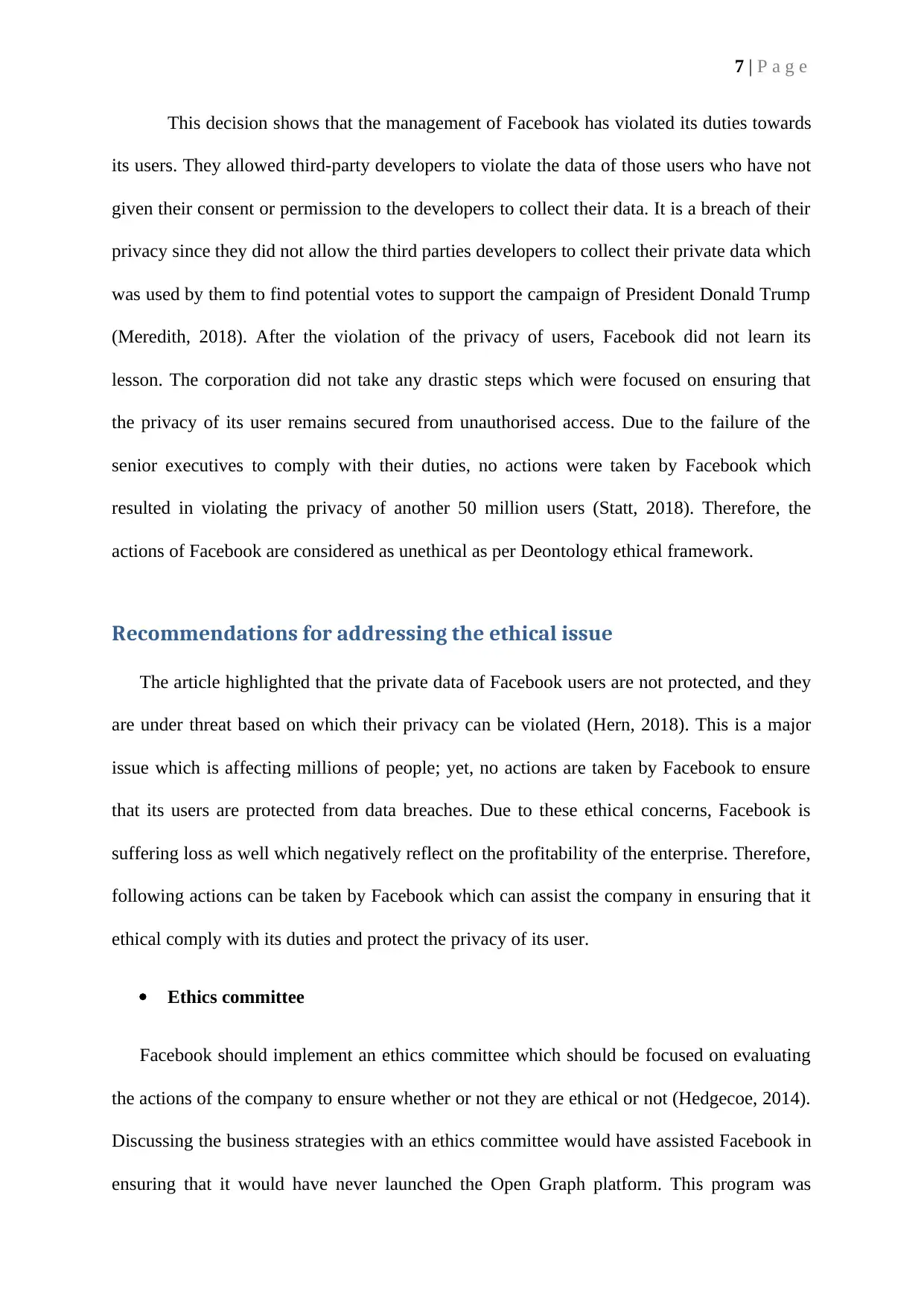
7 | P a g e
This decision shows that the management of Facebook has violated its duties towards
its users. They allowed third-party developers to violate the data of those users who have not
given their consent or permission to the developers to collect their data. It is a breach of their
privacy since they did not allow the third parties developers to collect their private data which
was used by them to find potential votes to support the campaign of President Donald Trump
(Meredith, 2018). After the violation of the privacy of users, Facebook did not learn its
lesson. The corporation did not take any drastic steps which were focused on ensuring that
the privacy of its user remains secured from unauthorised access. Due to the failure of the
senior executives to comply with their duties, no actions were taken by Facebook which
resulted in violating the privacy of another 50 million users (Statt, 2018). Therefore, the
actions of Facebook are considered as unethical as per Deontology ethical framework.
Recommendations for addressing the ethical issue
The article highlighted that the private data of Facebook users are not protected, and they
are under threat based on which their privacy can be violated (Hern, 2018). This is a major
issue which is affecting millions of people; yet, no actions are taken by Facebook to ensure
that its users are protected from data breaches. Due to these ethical concerns, Facebook is
suffering loss as well which negatively reflect on the profitability of the enterprise. Therefore,
following actions can be taken by Facebook which can assist the company in ensuring that it
ethical comply with its duties and protect the privacy of its user.
Ethics committee
Facebook should implement an ethics committee which should be focused on evaluating
the actions of the company to ensure whether or not they are ethical or not (Hedgecoe, 2014).
Discussing the business strategies with an ethics committee would have assisted Facebook in
ensuring that it would have never launched the Open Graph platform. This program was
This decision shows that the management of Facebook has violated its duties towards
its users. They allowed third-party developers to violate the data of those users who have not
given their consent or permission to the developers to collect their data. It is a breach of their
privacy since they did not allow the third parties developers to collect their private data which
was used by them to find potential votes to support the campaign of President Donald Trump
(Meredith, 2018). After the violation of the privacy of users, Facebook did not learn its
lesson. The corporation did not take any drastic steps which were focused on ensuring that
the privacy of its user remains secured from unauthorised access. Due to the failure of the
senior executives to comply with their duties, no actions were taken by Facebook which
resulted in violating the privacy of another 50 million users (Statt, 2018). Therefore, the
actions of Facebook are considered as unethical as per Deontology ethical framework.
Recommendations for addressing the ethical issue
The article highlighted that the private data of Facebook users are not protected, and they
are under threat based on which their privacy can be violated (Hern, 2018). This is a major
issue which is affecting millions of people; yet, no actions are taken by Facebook to ensure
that its users are protected from data breaches. Due to these ethical concerns, Facebook is
suffering loss as well which negatively reflect on the profitability of the enterprise. Therefore,
following actions can be taken by Facebook which can assist the company in ensuring that it
ethical comply with its duties and protect the privacy of its user.
Ethics committee
Facebook should implement an ethics committee which should be focused on evaluating
the actions of the company to ensure whether or not they are ethical or not (Hedgecoe, 2014).
Discussing the business strategies with an ethics committee would have assisted Facebook in
ensuring that it would have never launched the Open Graph platform. This program was
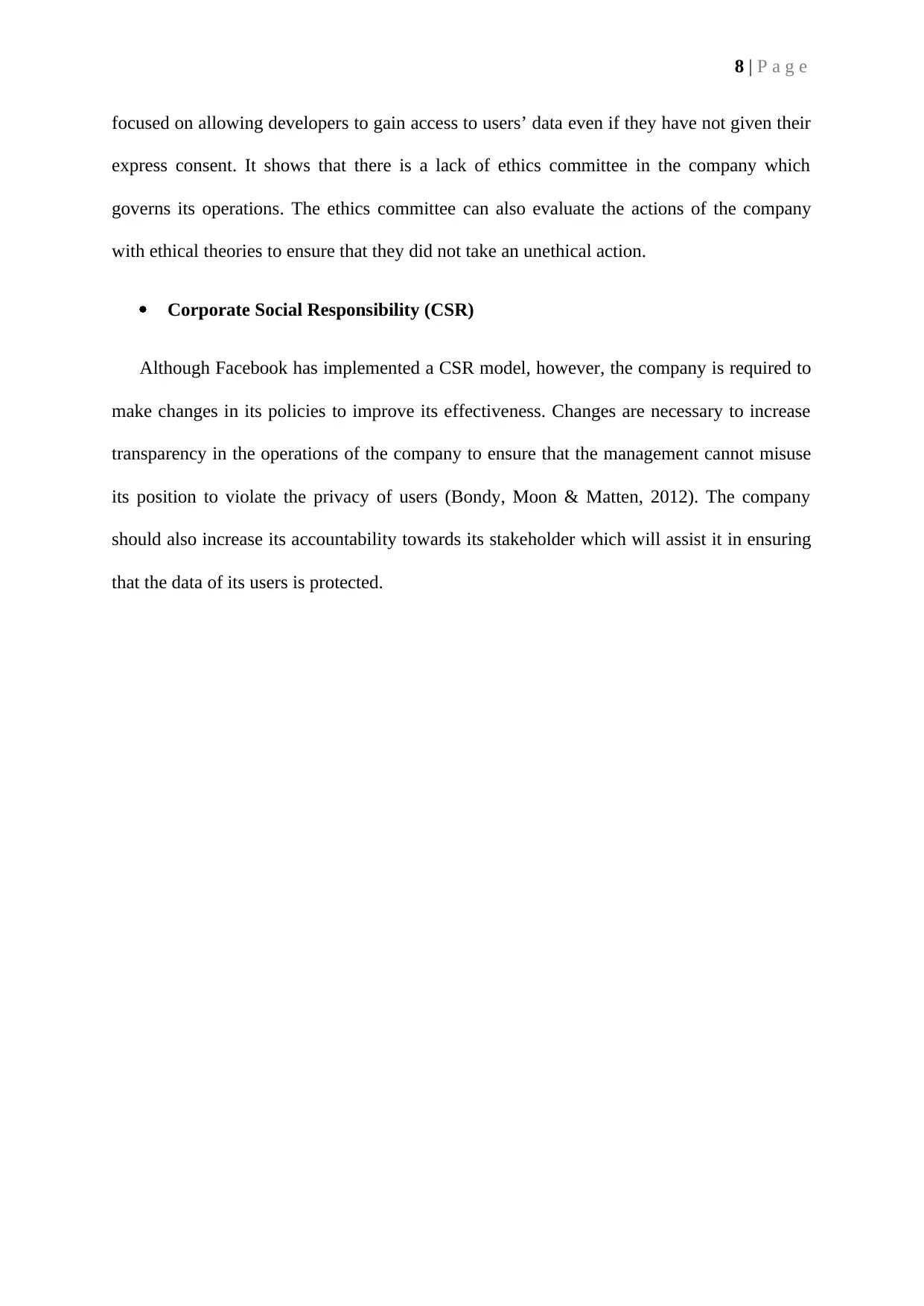
8 | P a g e
focused on allowing developers to gain access to users’ data even if they have not given their
express consent. It shows that there is a lack of ethics committee in the company which
governs its operations. The ethics committee can also evaluate the actions of the company
with ethical theories to ensure that they did not take an unethical action.
Corporate Social Responsibility (CSR)
Although Facebook has implemented a CSR model, however, the company is required to
make changes in its policies to improve its effectiveness. Changes are necessary to increase
transparency in the operations of the company to ensure that the management cannot misuse
its position to violate the privacy of users (Bondy, Moon & Matten, 2012). The company
should also increase its accountability towards its stakeholder which will assist it in ensuring
that the data of its users is protected.
focused on allowing developers to gain access to users’ data even if they have not given their
express consent. It shows that there is a lack of ethics committee in the company which
governs its operations. The ethics committee can also evaluate the actions of the company
with ethical theories to ensure that they did not take an unethical action.
Corporate Social Responsibility (CSR)
Although Facebook has implemented a CSR model, however, the company is required to
make changes in its policies to improve its effectiveness. Changes are necessary to increase
transparency in the operations of the company to ensure that the management cannot misuse
its position to violate the privacy of users (Bondy, Moon & Matten, 2012). The company
should also increase its accountability towards its stakeholder which will assist it in ensuring
that the data of its users is protected.
⊘ This is a preview!⊘
Do you want full access?
Subscribe today to unlock all pages.

Trusted by 1+ million students worldwide
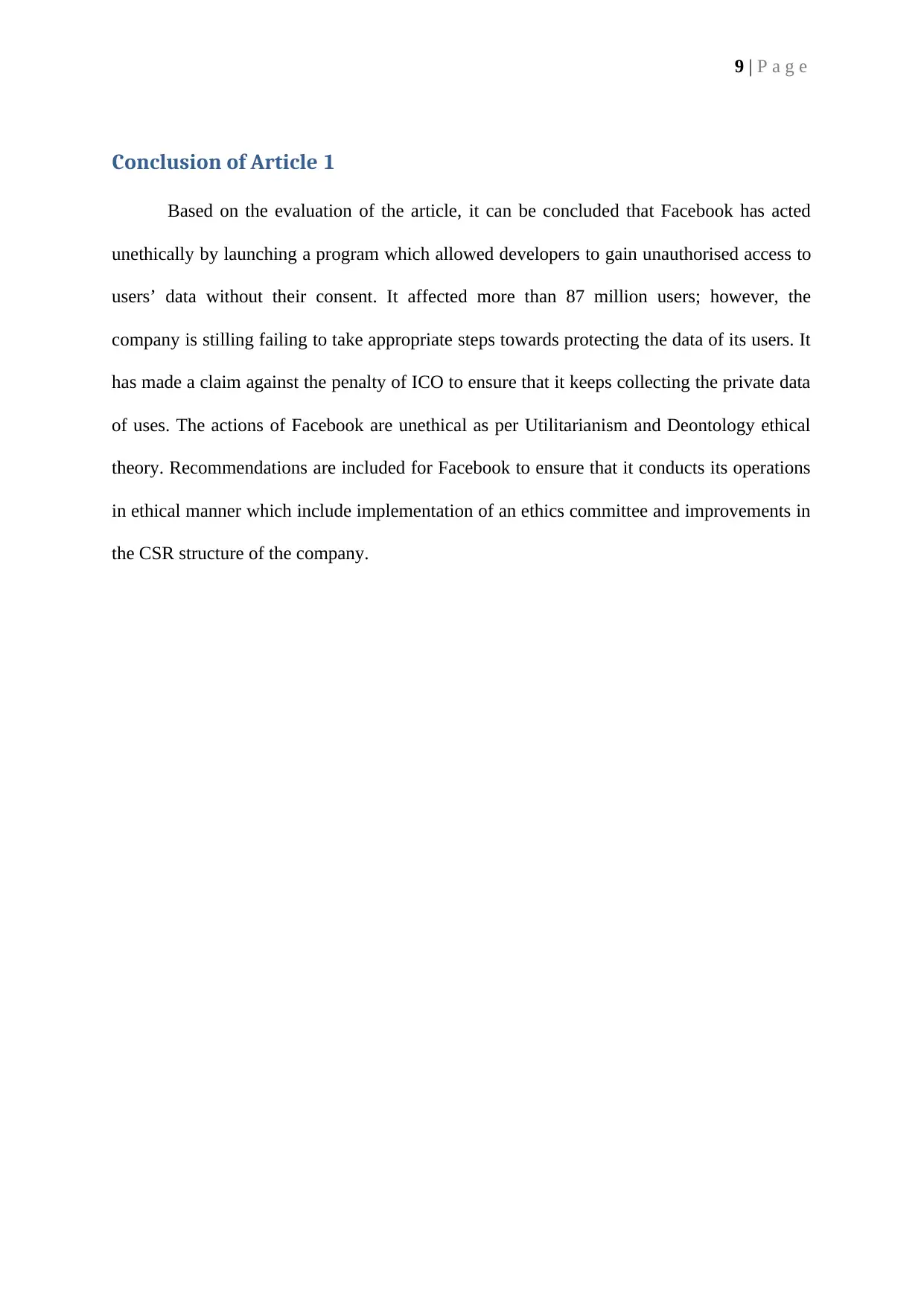
9 | P a g e
Conclusion of Article 1
Based on the evaluation of the article, it can be concluded that Facebook has acted
unethically by launching a program which allowed developers to gain unauthorised access to
users’ data without their consent. It affected more than 87 million users; however, the
company is stilling failing to take appropriate steps towards protecting the data of its users. It
has made a claim against the penalty of ICO to ensure that it keeps collecting the private data
of uses. The actions of Facebook are unethical as per Utilitarianism and Deontology ethical
theory. Recommendations are included for Facebook to ensure that it conducts its operations
in ethical manner which include implementation of an ethics committee and improvements in
the CSR structure of the company.
Conclusion of Article 1
Based on the evaluation of the article, it can be concluded that Facebook has acted
unethically by launching a program which allowed developers to gain unauthorised access to
users’ data without their consent. It affected more than 87 million users; however, the
company is stilling failing to take appropriate steps towards protecting the data of its users. It
has made a claim against the penalty of ICO to ensure that it keeps collecting the private data
of uses. The actions of Facebook are unethical as per Utilitarianism and Deontology ethical
theory. Recommendations are included for Facebook to ensure that it conducts its operations
in ethical manner which include implementation of an ethics committee and improvements in
the CSR structure of the company.
Paraphrase This Document
Need a fresh take? Get an instant paraphrase of this document with our AI Paraphraser
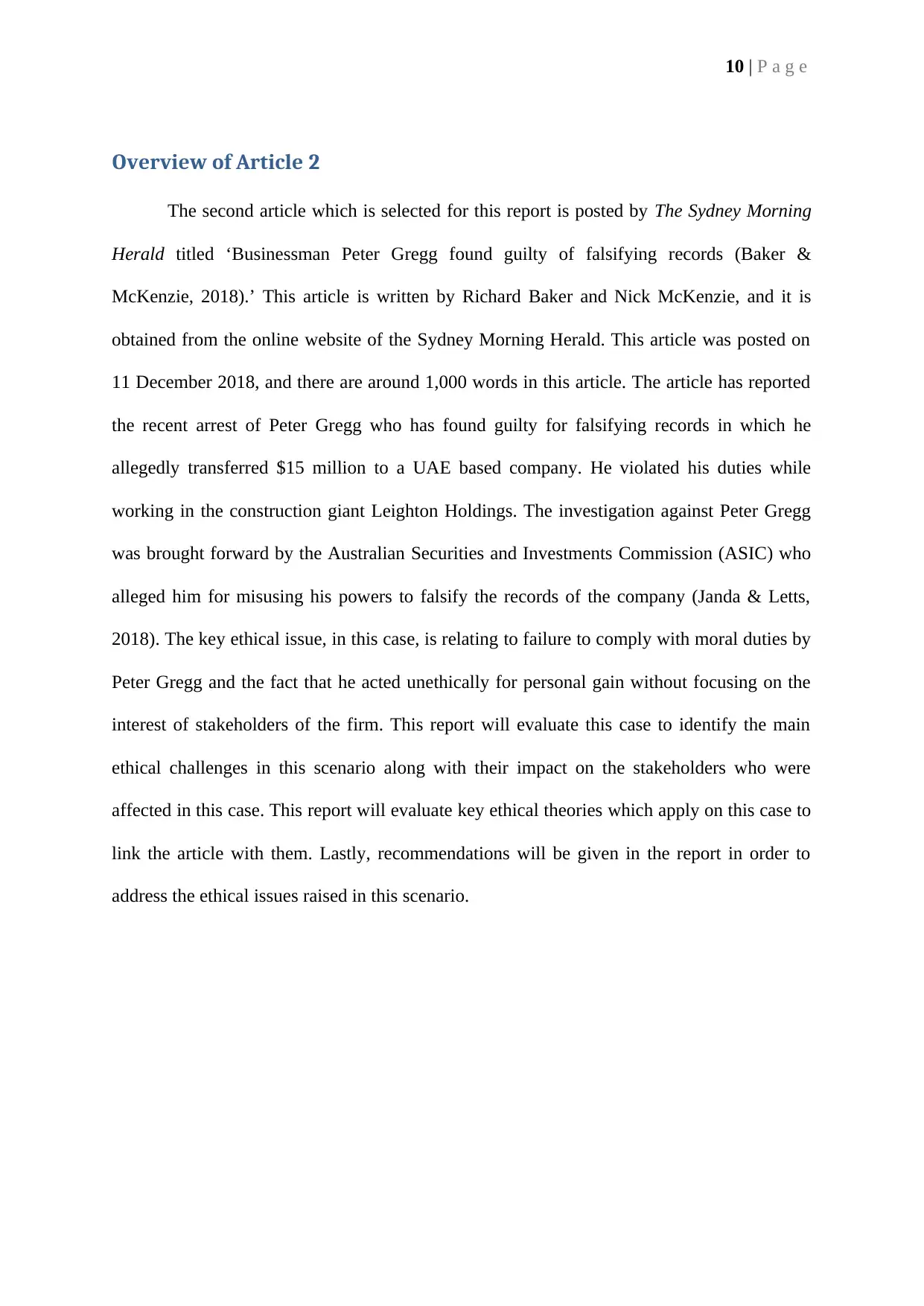
10 | P a g e
Overview of Article 2
The second article which is selected for this report is posted by The Sydney Morning
Herald titled ‘Businessman Peter Gregg found guilty of falsifying records (Baker &
McKenzie, 2018).’ This article is written by Richard Baker and Nick McKenzie, and it is
obtained from the online website of the Sydney Morning Herald. This article was posted on
11 December 2018, and there are around 1,000 words in this article. The article has reported
the recent arrest of Peter Gregg who has found guilty for falsifying records in which he
allegedly transferred $15 million to a UAE based company. He violated his duties while
working in the construction giant Leighton Holdings. The investigation against Peter Gregg
was brought forward by the Australian Securities and Investments Commission (ASIC) who
alleged him for misusing his powers to falsify the records of the company (Janda & Letts,
2018). The key ethical issue, in this case, is relating to failure to comply with moral duties by
Peter Gregg and the fact that he acted unethically for personal gain without focusing on the
interest of stakeholders of the firm. This report will evaluate this case to identify the main
ethical challenges in this scenario along with their impact on the stakeholders who were
affected in this case. This report will evaluate key ethical theories which apply on this case to
link the article with them. Lastly, recommendations will be given in the report in order to
address the ethical issues raised in this scenario.
Overview of Article 2
The second article which is selected for this report is posted by The Sydney Morning
Herald titled ‘Businessman Peter Gregg found guilty of falsifying records (Baker &
McKenzie, 2018).’ This article is written by Richard Baker and Nick McKenzie, and it is
obtained from the online website of the Sydney Morning Herald. This article was posted on
11 December 2018, and there are around 1,000 words in this article. The article has reported
the recent arrest of Peter Gregg who has found guilty for falsifying records in which he
allegedly transferred $15 million to a UAE based company. He violated his duties while
working in the construction giant Leighton Holdings. The investigation against Peter Gregg
was brought forward by the Australian Securities and Investments Commission (ASIC) who
alleged him for misusing his powers to falsify the records of the company (Janda & Letts,
2018). The key ethical issue, in this case, is relating to failure to comply with moral duties by
Peter Gregg and the fact that he acted unethically for personal gain without focusing on the
interest of stakeholders of the firm. This report will evaluate this case to identify the main
ethical challenges in this scenario along with their impact on the stakeholders who were
affected in this case. This report will evaluate key ethical theories which apply on this case to
link the article with them. Lastly, recommendations will be given in the report in order to
address the ethical issues raised in this scenario.
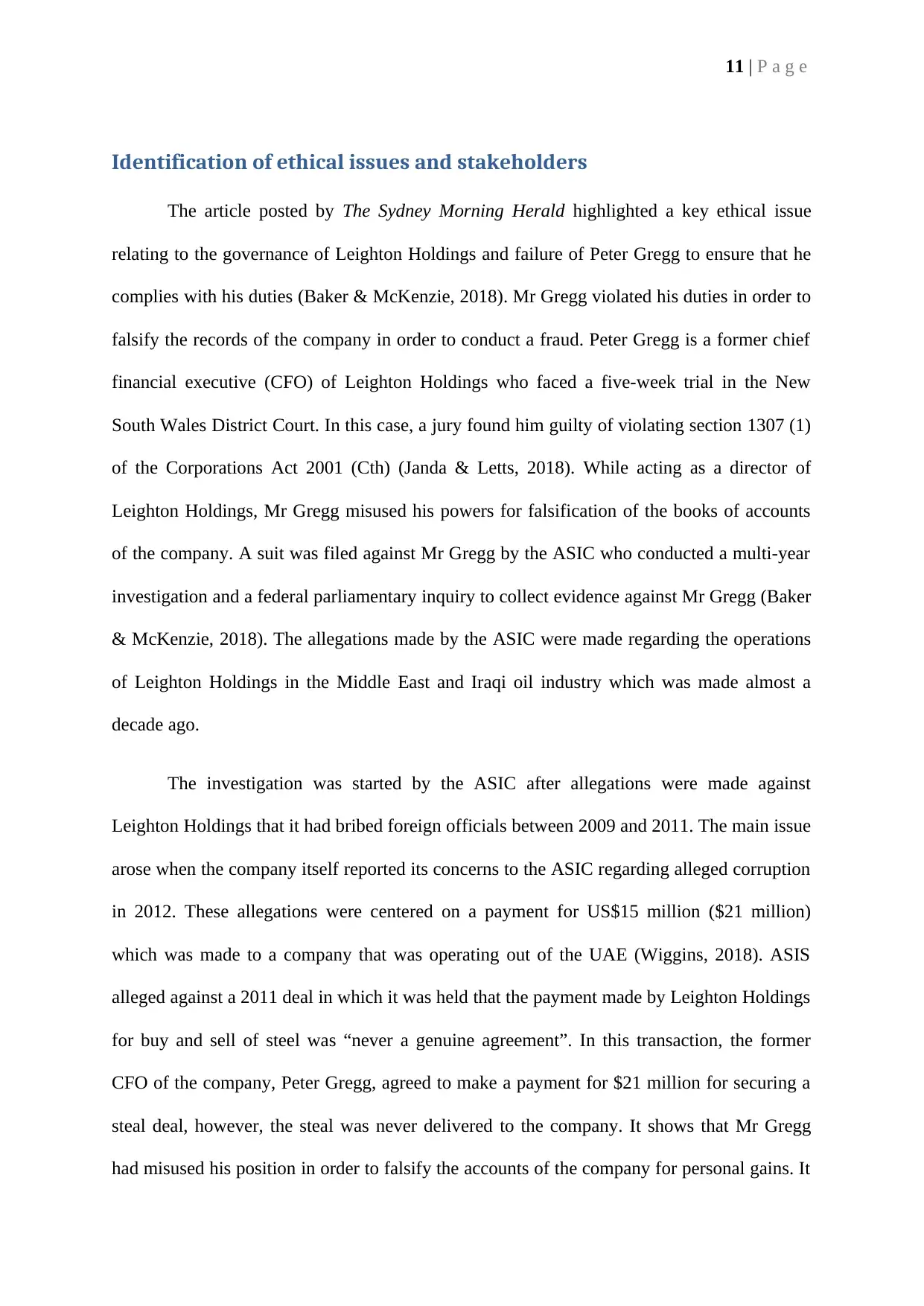
11 | P a g e
Identification of ethical issues and stakeholders
The article posted by The Sydney Morning Herald highlighted a key ethical issue
relating to the governance of Leighton Holdings and failure of Peter Gregg to ensure that he
complies with his duties (Baker & McKenzie, 2018). Mr Gregg violated his duties in order to
falsify the records of the company in order to conduct a fraud. Peter Gregg is a former chief
financial executive (CFO) of Leighton Holdings who faced a five-week trial in the New
South Wales District Court. In this case, a jury found him guilty of violating section 1307 (1)
of the Corporations Act 2001 (Cth) (Janda & Letts, 2018). While acting as a director of
Leighton Holdings, Mr Gregg misused his powers for falsification of the books of accounts
of the company. A suit was filed against Mr Gregg by the ASIC who conducted a multi-year
investigation and a federal parliamentary inquiry to collect evidence against Mr Gregg (Baker
& McKenzie, 2018). The allegations made by the ASIC were made regarding the operations
of Leighton Holdings in the Middle East and Iraqi oil industry which was made almost a
decade ago.
The investigation was started by the ASIC after allegations were made against
Leighton Holdings that it had bribed foreign officials between 2009 and 2011. The main issue
arose when the company itself reported its concerns to the ASIC regarding alleged corruption
in 2012. These allegations were centered on a payment for US$15 million ($21 million)
which was made to a company that was operating out of the UAE (Wiggins, 2018). ASIS
alleged against a 2011 deal in which it was held that the payment made by Leighton Holdings
for buy and sell of steel was “never a genuine agreement”. In this transaction, the former
CFO of the company, Peter Gregg, agreed to make a payment for $21 million for securing a
steal deal, however, the steal was never delivered to the company. It shows that Mr Gregg
had misused his position in order to falsify the accounts of the company for personal gains. It
Identification of ethical issues and stakeholders
The article posted by The Sydney Morning Herald highlighted a key ethical issue
relating to the governance of Leighton Holdings and failure of Peter Gregg to ensure that he
complies with his duties (Baker & McKenzie, 2018). Mr Gregg violated his duties in order to
falsify the records of the company in order to conduct a fraud. Peter Gregg is a former chief
financial executive (CFO) of Leighton Holdings who faced a five-week trial in the New
South Wales District Court. In this case, a jury found him guilty of violating section 1307 (1)
of the Corporations Act 2001 (Cth) (Janda & Letts, 2018). While acting as a director of
Leighton Holdings, Mr Gregg misused his powers for falsification of the books of accounts
of the company. A suit was filed against Mr Gregg by the ASIC who conducted a multi-year
investigation and a federal parliamentary inquiry to collect evidence against Mr Gregg (Baker
& McKenzie, 2018). The allegations made by the ASIC were made regarding the operations
of Leighton Holdings in the Middle East and Iraqi oil industry which was made almost a
decade ago.
The investigation was started by the ASIC after allegations were made against
Leighton Holdings that it had bribed foreign officials between 2009 and 2011. The main issue
arose when the company itself reported its concerns to the ASIC regarding alleged corruption
in 2012. These allegations were centered on a payment for US$15 million ($21 million)
which was made to a company that was operating out of the UAE (Wiggins, 2018). ASIS
alleged against a 2011 deal in which it was held that the payment made by Leighton Holdings
for buy and sell of steel was “never a genuine agreement”. In this transaction, the former
CFO of the company, Peter Gregg, agreed to make a payment for $21 million for securing a
steal deal, however, the steal was never delivered to the company. It shows that Mr Gregg
had misused his position in order to falsify the accounts of the company for personal gains. It
⊘ This is a preview!⊘
Do you want full access?
Subscribe today to unlock all pages.

Trusted by 1+ million students worldwide
1 out of 22
Related Documents
Your All-in-One AI-Powered Toolkit for Academic Success.
+13062052269
info@desklib.com
Available 24*7 on WhatsApp / Email
![[object Object]](/_next/static/media/star-bottom.7253800d.svg)
Unlock your academic potential
Copyright © 2020–2026 A2Z Services. All Rights Reserved. Developed and managed by ZUCOL.





